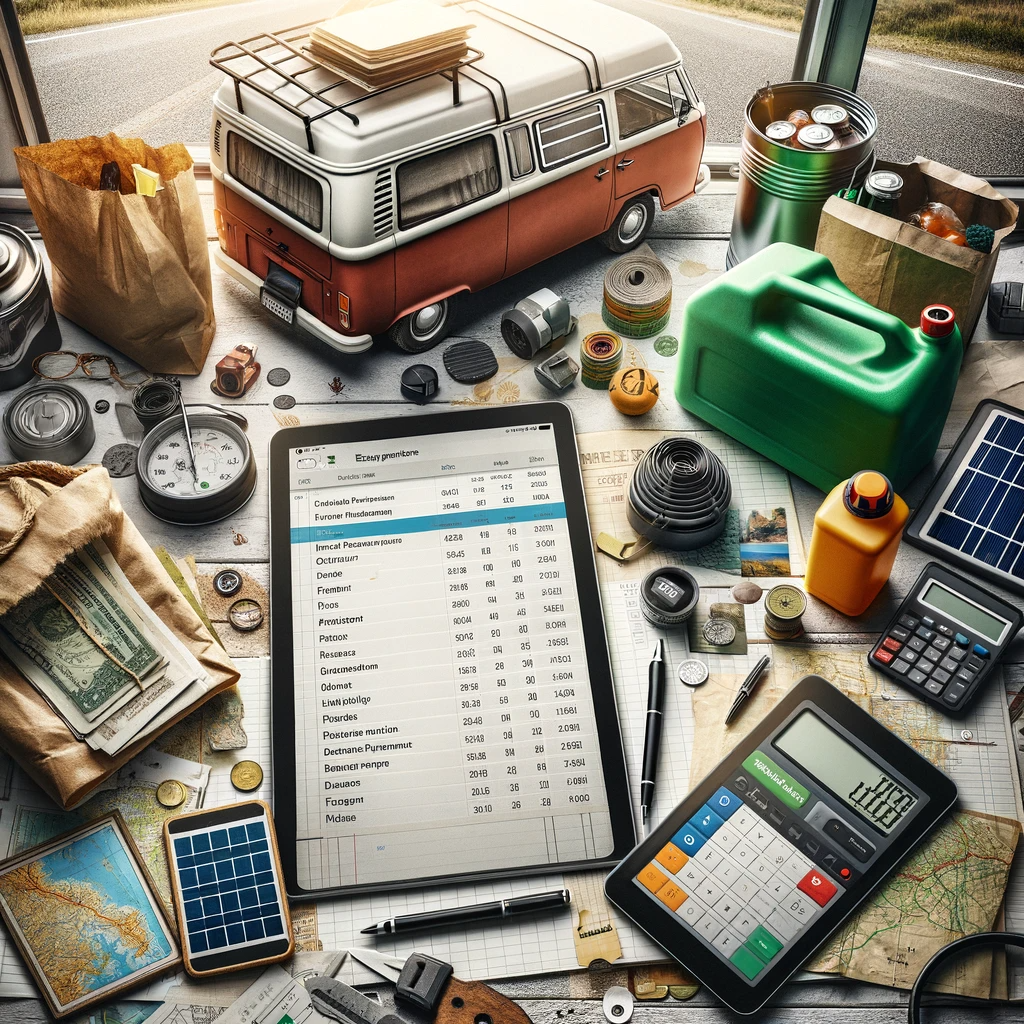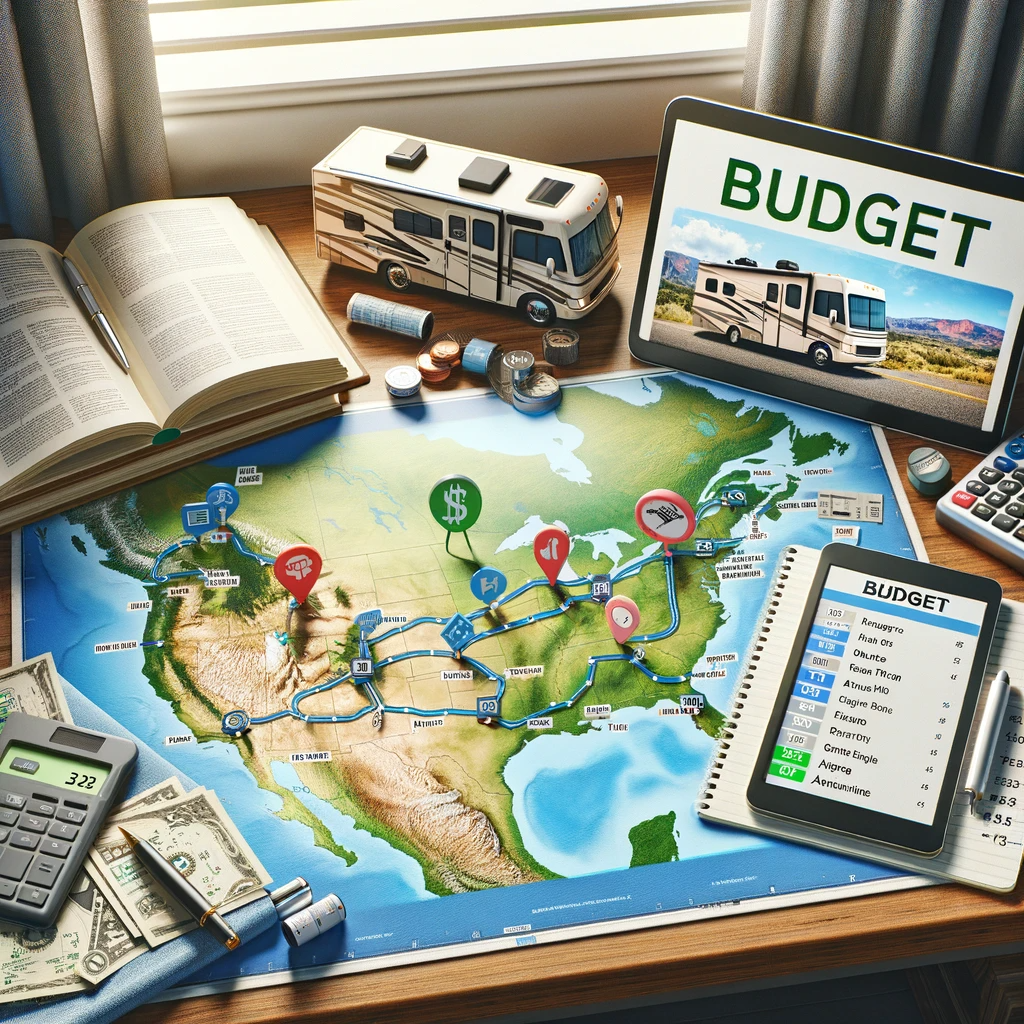Van Life Travel Costs in 2024!
Dreaming of van life? Beyond the captivating sunsets and open roads lies the reality of Van life travel costs. Whether you’re a van life veteran or just fueling up for the first time, understanding these costs is crucial.
In this guide we’ll shed light on the financial landscape of the open road, setting you up for budget-savvy adventures ahead.
Van Life Travel Costs – Fixed vs. Variable
When planning your van life journey, it’s essential to recognize the differences between fixed and variable costs. This knowledge will provide a foundational understanding, enabling better budget management.
Understanding the Basics
Differentiating between costs can be the difference between a comfortable journey and financial stress. Fixed costs are expenses that remain consistent month-to-month, irrespective of how much you use your van.
In contrast, variable costs change depending on several factors, such as distance traveled or how frequently certain amenities are used.
Examples in Van Life
In the realm of van life, fixed costs might include monthly loan payments or insurance premiums. On the other hand, variable costs could encompass fuel expenses, which can fluctuate based on how much you drive and where you’re purchasing gas.
Understanding which costs are consistent and which can change is the first step in crafting a sustainable budget.
Van Life Travel costs – Fixed Expenses
Every van lifer will have some non-negotiable costs. Recognizing these and budgeting for them appropriately ensures that you’re never caught off guard by monthly bills.
Van Payment/Loan
If you didn’t buy your van outright, you’d have a fixed monthly payment to consider. This is usually a predetermined amount that you’ll need to pay, regardless of how often or where you travel.
Ensure you’re familiar with the terms of your loan, as some might offer flexibility or options for early payoff.
Insurance
Every van lifer needs insurance, both for their vehicle and, often, for the contents inside. Premiums typically remain consistent month-to-month.
It’s crucial to understand your coverage, ensuring you’re protected against potential damages or theft, especially if you’ve made significant modifications to your van.
Regular Maintenance
While maintenance encompasses both fixed and variable costs, certain aspects are non-negotiable. Regular oil changes, brake checks, and other routine servicing are costs you’ll encounter periodically, regardless of how much you’ve traveled in a given period.

Storage Fees
For those items that don’t have a place in your van, a storage unit or similar solution might be necessary. Monthly storage fees can add up, especially if you’re keeping valuables or larger items safe.
Consider periodically assessing whether you still need stored items or if it’s time to sell, donate, or dispose of them.
Van Life Travel costs – Variable Expenses
The unpredictable nature of life on the road means that some costs will ebb and flow as you travel. These variable expenses require a keen awareness and sometimes even a contingency plan to ensure they don’t derail your budget.
Fuel
The cost of fuel is invariably one of the most significant variable expenses for van lifers, and although you can do some things to improve gas mileage in your van.
This expense can fluctuate based on your van’s fuel efficiency, driving habits (like speed and acceleration patterns), and where you fill up, with some regions having noticeably higher fuel prices than others.
Campsite/Parking Fees
While boondocking or free camping is an option in many areas, sometimes you’ll find yourself needing or wanting the amenities and security of a paid campsite.
Costs can vary widely, from nominal fees in national forests to more premium prices in well-equipped RV parks in popular locations.
Food and Groceries
Eating on the road presents a balancing act. While it’s often cheaper to buy groceries and prepare meals in your van, sometimes convenience or the lure of local cuisine might lead you to dine out.
Prices can also vary based on where you shop, with remote areas often having higher prices due to transport costs.
Unexpected Repairs
Even with regular maintenance, unexpected repairs can pop up. Whether it’s a tire puncture or more significant mechanical failures, these unpredictable expenses can be a substantial out-of-pocket cost.
Tourist Attractions & Activities
Part of the allure of van life is exploring new places. Entrance fees to national parks, guided tours, or even a spontaneous zip-lining adventure all come with associated costs.
Connectivity
Staying connected on the road, especially if working remotely, can incur costs. Whether it’s for a mobile hotspot, upgraded phone data plans, receiving mail, or occasional co-working space fees, ensuring constant connectivity isn’t always cheap.
Budgeting for the Journey
Crafting a realistic budget is pivotal for a stress-free van life experience. With fluctuating costs and the occasional surprise expense, financial foresight becomes your best tool.

Building a Realistic Budget
Start by tracking all your expenses for a month or two to understand where your money goes. Tools like mobile apps or even good old-fashioned pen and paper can help.
Once you have a clear picture, allocate funds to each category, keeping in mind both fixed and variable costs.
Emergency Funds
In a lifestyle as unpredictable as van life, having an emergency fund for van life is not a luxury—it’s a necessity. These funds will cushion you against unexpected expenses, from sudden van breakdowns to medical emergencies.
Strategies to Minimize Costs
Being proactive can help keep costs down. Simple actions, such as driving at fuel-efficient speeds, leveraging loyalty cards for discounts, or even planning your route to reduce mileage, can lead to significant savings.
Always be on the lookout for free or discounted campsites and consider joining van life communities to share tips and resources.
Money Management on the Road
When living a life as dynamic as the van life, traditional financial management methods might not always apply. Adapting to the constant change, and ensuring that your money is always accessible and safe, becomes crucial.
Mobile Banking
For the modern van lifer, mobile banking is a game-changer. These digital solutions offer 24/7 access to your funds, instant transfers, and the ability to monitor your account on the go.
With features like mobile check deposits, bill payments, and instant notifications, it reduces the need for physical bank visits, which might not always be feasible.
Using Cash vs. Card
While cards—credit or debit—offer convenience and often additional security, there are places or situations where cash is king. More remote areas might not have card facilities, or there could be instances where cash-only tolls or parking meters come into play.

However, carrying large sums of cash can be risky. Striking the right balance based on your itinerary is crucial, below are some considerations for when to choose cash vs card for van life.
| Scenario | Cash Advantages | Card Advantages |
|---|---|---|
| Remote Area Purchases | Preferred in areas with limited card facilities. | Might not be accepted everywhere. |
| Toll Booths | Some toll booths are cash-only. | Many tolls accept electronic payments or card swipes. |
| Emergency Situations | Immediately available without the need for ATMs. | Useful for large unexpected expenses (e.g., repairs). |
| Farmers’ Markets & Local Vendors | Many only accept cash. | Some may have portable card machines or apps. |
| Parking Meters | Many older meters still require coins. | Modern meters may accept card payments. |
| Small Purchases | Easier for quick, minimal purchases (e.g., coffee). | Might incur minimum purchase requirements. |
| Tipping | Direct and immediate for service workers. | Not all places allow adding tips on a card. |
| Overseas Travel | Some local vendors prefer cash in local currency. | Cards may come with foreign transaction fees. |
| Discounts & Bargains | Some vendors offer better prices for cash. | Fixed prices; less room for negotiation. |
| Transaction Tracking | Requires manual recording for budgeting. | Digital statements allow easy tracking and budgeting. |
Keeping Track of Expenditures
Without regular check-ins on your finances, it’s easy for expenses to spiral. Establishing a routine, be it weekly or monthly, to review your spending helps prevent overspending and ensures you stay within your budget. Tools like budgeting apps or expense trackers can be valuable in maintaining financial discipline.
Author
-

Zaara, a kindred spirit of the open road, has nurtured a deep-seated love for RV travel since her childhood. Journeying with her parents, she learned early on to cherish the little things that make life rich and fulfilling. This emotional depth and appreciation for simplicity have become the cornerstone of her life philosophy. A firm believer in the idea that true happiness is found in nature's embrace, Zaara continues this legacy of exploration alongside her husband, Augustus. Her passion extends beyond landscapes to the joy of connecting with life's purest forms - the unconditional love of dogs and the innocence of babies. These connections reflect her nurturing soul and emotional acuity. Zaara is also a culinary enthusiast, delighting in creating meals that blend flavors from their travels, infusing each dish with memories and love. Her expertise lies in living fully, finding joy in every moment, and inspiring others to seek happiness in life's simple, natural wonders.
View all posts

